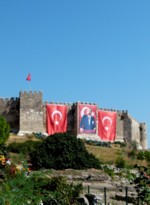Pamukkale
The modern Turkish town of Pamukkale is on the plane below a ridge out of which seeps mineral-rich water that has been heated by volcanism and dissolved the limestone through which it flows. Just as in a limestone cave the dissolved calcium carbonate is gradually deposited and crystallised into travertine. On the ridge above Pamukkale there have been upwards of 18 hot springs pouring supersaturated water over the hillside for hundreds of millennia so that pools similar to those seen in caves but on a much larger scale have created terraces and ponds that have attracted people for at least 3,000 years.
This phenomenon is not unique to this location. There are at least a dozen similar travertine terraces around the world but because of variation in location and circumstance each is unique in its size shape and extent.
The first recorded settlement here was established around the 7th century BCE but it was the Romans who built the spa town of Hierapolis on the ridge above the cascades. The Romans famously had a 'thing' for marble and hot water.
After nearly three thousand years the greatest attraction at Hierapolis continues to be walking barefoot on the adjoining hillside, sometimes up to the knees, in puddles of mineral-rich thermal waters that flow down white travertine terraces. We found it rough underfoot and quite uncomfortable and didn't last long. But for many, judging by the jostling, selfy-taking, picture-posing, multitude, it's one of those 'things you have to do before you die'. Unfortunately millions of oily feet began to discolour the travertine. So the present limited watercourse, accessible for public puddling, is quite narrow and unpleasantly overcrowded.
The travertine terraces
As advertised, it's visually spectacular and this one is unique in the world. Yet I was disappointed. I'd, unreasonably, expected it to be a lot bigger - something like Cappadocia. A moment's thought in advance should have told me otherwise. The terraces stem from a single limestone deposit. Seen from above in Google Earth there are two linked fans of travertine spreading like butterfly wings below the springs and a third smaller area, some distance along the ridge.
Our pleasant hotel was a little out of town, but within walking distance to the decorative lake below the main cascade, complete with ice-cream vendors; paddle boats; turtles; and water birds. The latter not to Wendy's liking. Yet we walked there, back and forth, a couple of times; then drove up to Hierapolis.
In its day Hierapolis was a popular Roman resort and retirement location. The Miami of its day. Many Romans chose to have their bodies stored here after their brain had ceased to function and was thus devoid of any further sensory input - id est [i.e] they had died. Thus the site is remarkable for the number of sarcophagi that are still scattered about, these days empty, except, perhaps, for dust.
Again it brought to those lines of Byron's from Don Juan, quoted above: not a pinch of dust remains of Cheops.
In due course Hierapolis attracted the interest of that consummate builder the Emperor Hadrian who added one of the best preserved/restored Roman Amphitheatres we've seen. And we've now seen quite a few.
The Amphitheatre at Hierapolis
For a period in modern times Hierapolis had resort hotels built over the ancient ruins but these have since been demolished and the city is being restored as World Heritage Site. Yet, compared to Ephesus, the remains are rather sparse these days.
There is now a museum presenting some of the objects found here that is quite interesting.
Hierapolis Museum
I was intrigued by this section of a frieze - presumably from a smashed sarcophagus - apparently depicting a suckling child and a goat. Was this the ancients' alternative to a bottle? Alongside, the efficacy of a toga, as a means of protecting one's modesty, is called into question, as in Antalya (above).
Once away from the tourist spots, the modern town at the foot of the hill, is semi-rural and quite shabby. It was an unfortunate last stop in otherwise seemingly prosperous Turkey.
At the end of our last night in Turkey we drove the 70 km to Denizli Airport where we dropped the trusty Ford in the, at that time, unattended car-park and joined an early morning flight to Skopje for our next adventure: another drive further up the Adriatic coast, all the way to Vienna in Austria, through the Balkans.
The trip continues...

